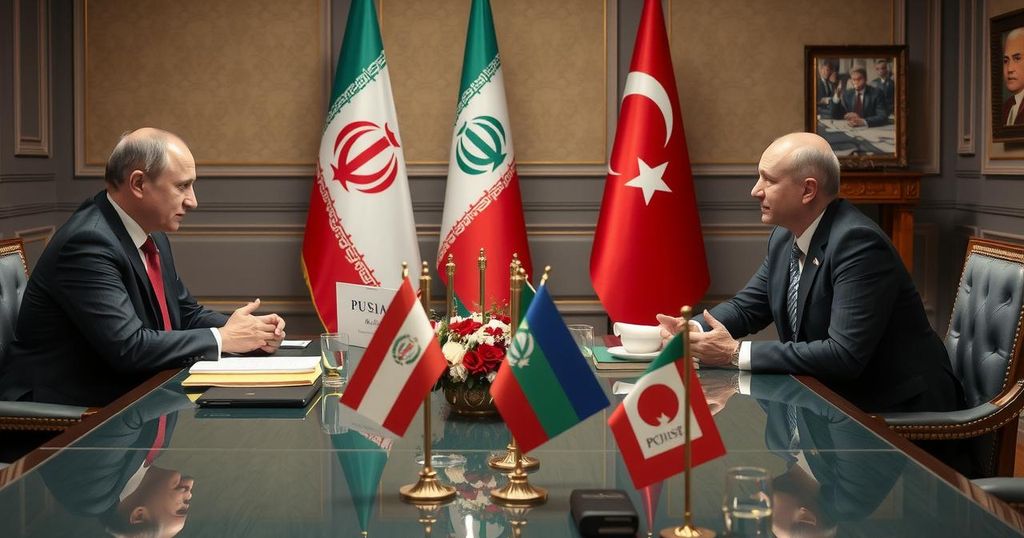Turkey, Russia, and Iran will meet in Qatar to discuss responses to recent advances by Islamist rebels in Syria, specifically after the capture of Aleppo. The meeting occurs on the sidelines of the Doha Forum, aimed at finding solutions through the Astana process. Stakeholders express concerns about Kentucky’s strategic interests, the potential for ISIS resurgence, and the ongoing humanitarian crisis stemming from the conflict.
This weekend, Turkey, Russia, and Iran are scheduled to convene in Qatar to address the recent escalation of conflict in Syria, particularly following a surprising offensive by Islamist rebels that has altered the dynamics of the civil war. The discussions will occur alongside the Doha Forum, an event that gathers officials and experts from across the globe. Turkish Foreign Minister Hakan Fidan will lead Turkey’s delegation for the meeting, aimed at seeking solutions within the framework of the Astana process, initiated to find political resolutions to the prolonged conflict in Syria.
The Astana process, initiated in 2017 by Russia, Iran, and Turkey, sought to foster a political settlement in the Syrian civil war, which has been ongoing for thirteen years. The situation has deteriorated recently as Hayat Tahrir al-Sham (HTS) successfully captured Aleppo and advanced towards Hama and Homs, locations that have remained under government control since the outbreak of the war. Russian President Vladimir Putin emphasized the necessity of halting aggression against Syria during recent communications with Turkish President Recep Tayyip Erdogan, who reaffirmed Turkey’s commitment to Syria’s territorial integrity while advocating for a political solution involving the Assad government.
Turkey has been a supporter of the Syrian National Army, which stands opposed to the U.S.-backed Syrian Democratic Forces (SDF). As clashes erupted between these competing militias following the HTS offensive, concerns regarding the implications of these developments for regional stability have arisen. Observers note that Russia’s focus on its ongoing conflict with Ukraine may influence its involvement in Syria, while Iran is facing challenges related to its position in the region due to heightened hostilities against its proxies.
Former U.S. officials, including Robert Ford, have raised questions about whether the recent rebel advances might compel Assad’s government and its allies to seek a compromise. However, both Ford and James Jeffrey highlighted the difficulties in achieving this, owing to the strategic interests of Russia and Iran in maintaining their foothold in Syria. Moreover, Turkey’s apprehensions regarding the Kurdish presence in Syria, which it associates with the PKK, add another layer of complexity to the volatile situation.
As tensions continue to rise, the United States remains engaged, monitoring developments with nearly 900 troops stationed to support the SDF against ISIS. Officials underscore the need to prevent the resurgence of ISIS amid this chaos, suggesting that the recent turmoil stems from the Assad regime’s refusal to engage meaningfully in the political process. Analysts indicate that a rapid ceasefire could lead to the return of countless Syrian refugees currently in Turkey, a priority for Ankara as it hosts a significant refugee population.
The ongoing Syrian civil war, which began in 2011, has seen multiple actors and shifting alliances. Russia and Iran have historically supported the Syrian government led by Bashar al-Assad, while Turkey has aligned itself with opposing rebel factions. The Astana process was established in 2017 as a diplomatic initiative to facilitate peaceful resolutions to the conflict. Recently, significant territorial shifts have occurred as Islamist groups have gained ground, necessitating renewed discussions among the stakeholders. The geopolitical landscape is further complicated by external influences and the enduring challenge posed by ISIS, keeping the region in a state of alert.
The upcoming discussions in Qatar represent a critical juncture for the involved parties as they seek to navigate the recent territorial gains by Islamist rebels within Syria. The interests of Turkey, Russia, and Iran must be balanced against the backdrop of a complex and evolving conflict that integrates domestic and international dimensions. The outcome of these talks may have widespread implications for regional stability and the humanitarian situation in Syria, particularly concerning the potential return of refugees. Effective dialogue and cooperation are paramount to addressing these pressing challenges.
Original Source: www.voanews.com






